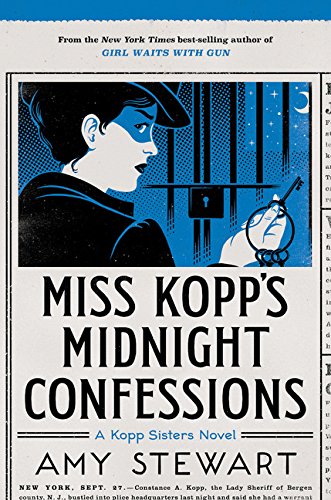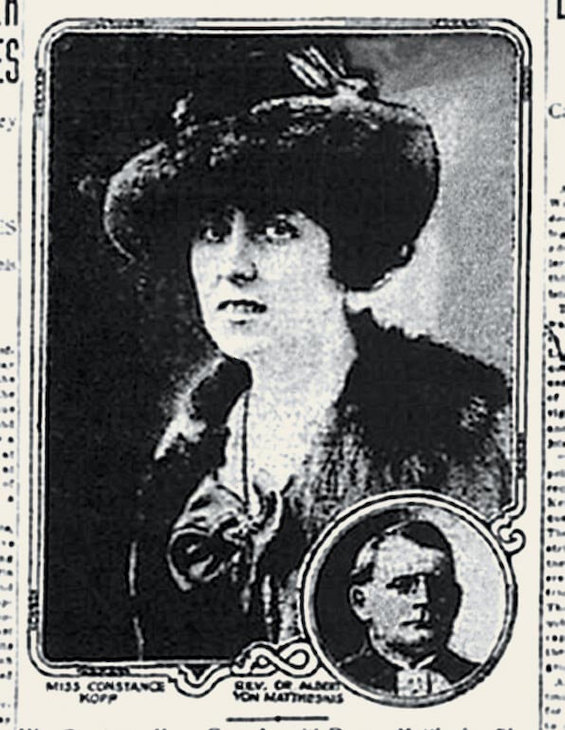
This is not a detective story, despite the fact that it’s one in a series of historical novels about New Jersey’s first female deputy sheriff (and apparently the first anywhere to carry a gun). Nor is it a thriller or even especially suspenseful. Instead, Miss Kopp’s Midnight Confessions is a tale of crime and law enforcement. And the laws in question are the morality laws in force in much of the United States during World War I. Those laws subjected women to the unwelcome attention of the police and the courts for “crimes” so innocent as simply leaving the straightjacket of rigid parental control at age eighteen to seek a job and an independent life.
Estimated reading time: 5 minutes
The state’s first female deputy sheriff was born for the job
Constance Kopp was the Under Sheriff of Bergen County during World War I for two years. She served under Sheriff Robert Heath of Hackensack, New Jersey, until a Republican was elected to replace him in November 1916. The man was a bitter enemy who fired her upon gaining the post. Wildly exaggerated stories about her and her exploits appeared in newspapers throughout the United States. She was an imposing figure, six feet tall and stocky, at a time when the average American male was 5’8″. And “she knew how to put her size to an advantage.” Miss Kopp’s Midnight Confessions and the other books in the series focus on Constance as the protagonist, but her two “sisters” also play major roles in the stories. (One of the “sisters” was, in fact, her daughter, Fleurette.)
Miss Kopp’s Midnight Confessions (Kopp Sisters #3) by Amy Stewart (2017) 402 pages ★★★☆☆

Three strands of the story
Three strands make up the skein of the plot, two involving “criminals” charged under the morality laws and the third centered on Constance’s daughter, Fleurette.
Edna Heustis
Edna Heustis is a serious, hardworking young woman who leaves home at eighteen to find a life of her own. She lands a job in a DuPont munitions factory in Pompton Lakes, New Jersey, and a furnished room in a boarding home for other young women who work there. Suddenly one morning, the police turn up and arrest her on a charge of “waywardness,” which the law treats as a criminal offense. Her mother had complained to the authorities that she had run away from home. The cops take her to jail in Hackensack, New Jersey, where Constance Kopp, as the state’s first and only female deputy sheriff, is the matron. Working around the law and accepted practice rather than through it, Constance finds a way to get Edna out of jail and keep her there.
Minnie Davis
Sixteen-year-old Minnie Davis craves romance and excitement. She runs away from her strict and unloving parents to New York City. There, she persuades an attractive young man to pick her up. Tony works as a card dealer on a riverboat. The two set up house in a small, furnished room above a bakery in New Jersey, posing as husband and wife. When police discover Minnie living alone there, they suspect Tony of “white slavery” and arrest them both. Minnie is sent to jail in Hackensack as a witness—a common practice at the time—but also faces a possible charge of “illegal cohabitation.” Constance spends weeks untangling the truth.
Fleurette Kopp
At eighteen, Fleurette is a gifted seamstress, but she dreams of a life on the stage. When a famous vaudeville actress comes to the nearby town of Paterson advertising auditions for a chance to join her show, Fleurette jumps at the chance. It’s a money-making scam operated by the actress’ husband and manager. They have no intention of selecting anyone who auditions, but young women flock to the theater and pay the $5 fee to perform. Fleurette’s “sisters,” Constance and Norma, know all this, but the girl insists. And shortly after the audition, Fleurette disappears. Constance and Norma suspect she’s joined the vaudeville troupe and set out on a frantic search to find her. Constance may be New Jersey’s first female deputy sheriff, but she is also a mother wracked with worry.
“Midnight confessions” that reveal pervasive sexism
Amy Stewart deftly weaves these three strands together. In the process of following each of the three stories, we encounter again and again the misogyny that permeated American life and the legal system just a century ago. Constance Kopp’s “midnight confessions,” her late-night conversations with the inmates under her care in the Hackensack jail, reveal just how difficult it was for most young women in the World War I era to live independent lives. Constance “couldn’t think of a single one who’d been found innocent of the charges and released.” And she does all in her power to change that.
About the author

Wikipedia describes Amy Stewart as “an American author best known for books on horticulture and the natural world.” Her most widely read book is The Drunken Botanist: The Plants That Create the World’s Great Drinks. However, as of 2021, she has also written seven novels in the Kopp Sisters series.
For related reading
Previously I reviewed the first two of Amy Stewart’s novels about Constance Kopp and her sisters:
- Girl Waits With Gun (She was the country’s first female deputy sheriff)
- Lady Cop Makes Trouble (A real lady cop a century ago in an excellent fact-based crime novel)
You might also enjoy my posts:
- Top 10 mystery and thriller series
- 20 excellent standalone mysteries and thrillers
- 5 top novels about private detectives
- 30 outstanding detective series from around the world
- Mystery and thriller series starters can be misleading
For an abundance of great mystery stories, go to Top 20 suspenseful detective novels. And if you’re looking for exciting historical novels, check out Top 10 historical mysteries and thrillers.
And you can always find my most popular reviews, and the most recent ones, on the Home Page.


























